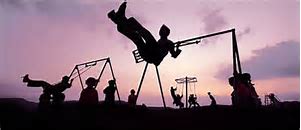The cry of every child rings in our ears bringing sweet remembrances of days long past when we too eagerly ran out to play with our friends. But times change, we grow older, and we don’t play so much anymore. Unfortunately, a decline in play doesn’t only happen because we get older. In the last 50 years, play has declined dramatically for children. Our focus has changed to test scores and building resumes as opposed to free play. Children’s free time is scheduled and controlled more than any other generation before.
Recently my principal included a link to an article in our OneNote Staff notebook under the heading Lonely Boys. The article, Thoughts on Vegas, and Why Men Keep Doing This by Charlie Hoehn, outlines the relationship between play and mental illness. Hoehn has a particular focus on boys and men in his article while I am going to speak in more general terms.
In essence, mental and emotional health deteriorates when children are deprived of play. Charlie Hoehn describes Dr. Stuart Brown’s research studying commonalities between “The Texas Sniper” and other mass murderers. Brown’s conclusions showed lack of play as a child had a significant negative impact on those he studied.
Brown recalls:
None of them engaged in healthy rough-and-tumble play. The linkages that lead to Charles Whitman producing this crime was an unbelievable suppression of play behavior throughout his life by a very overbearing, very disturbed father.
Hoehn asserts that
Play may be God’s greatest gift to mankind. It’s how we form friendships, and learn skills, and master difficult things that help us survive. Play is a release valve for stress, and an outlet for creativity. Play brings us music, comedy, dance, and everything we value.
Healthy play is necessary for growth and success. Play is how children learn to understand social systems and navigate the world, build friendships and de-stress. Unfortunately, our North American lifestyle and school system have progressively been limiting play. In fact, Hoehn comments that lack of play today has resulted in
a generation of the most anxious, depressed, and suicidal American children on record.
Hoehn continues to enlighten us with research from Dr. Peter Gray:
Over the past half century, in the United States and other developed nations, children’s free play with other children has declined sharply. Over the same period, anxiety, depression, suicide, feelings of helplessness, and narcissism have increased sharply in children, adolescents, and young adults… The decline in play has contributed to the rise in the psychopathology of young people.
In short, Hoehn concludes that, more than ever, people feel alone because they don’t have strong ties of friendship that are normally developed through play.
Hoehn’s article meshes well with a webinar I heard recently, The Science of Happiness by Kim Strobel, during the Ditch That Textbook Digital Summit. In the webinar, Strobel focuses primarily on teachers. She asserts that teachers are quite hard on themselves and tend to ‘overdo it’. Many teachers put in long hours in order to provide the best learning experiences for their students, but it is at the expense of their own self-care and wellbeing as well as their family time. This type of work and time commitment leads them to not only exhaustion but unhappiness. Strobel points out that this behaviour is actually counterintuitive given that we are actually up to 31% more productive when we are happy.
The take away?
First, as a teacher, make time for play. Let students explore in their learning. They will become more well-rounded, emotionally stable people in the end.
Second, we all need to be happy, go out and play, enjoy our family and downtime because we need to in order to become our best selves.
Happy holidays everyone, recharge and play.

